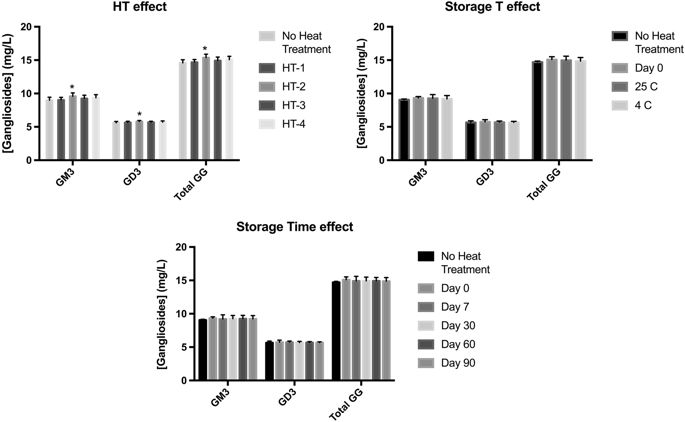npj Science of Food ( IF 6.3 ) Pub Date : 2018-03-13 , DOI: 10.1038/s41538-018-0013-9 Jaime Salcedo , Sercan Karav , Annabelle Le Parc , Joshua L. Cohen , Juliana M. L. N. de Moura Bell , Adam Sun , Matthew C. Lange , Daniela Barile

|
Donor milk is the best option when mother’s own milk is unavailable. Heat treatments are applied to ensure donor milk safety. The effects of heat treatments on milk gangliosides—bioactive compounds with beneficial antibacterial, anti-inflammatory, and prebiotic roles—have not been studied. The most abundant gangliosides in non-homogenized human milk were characterized and quantified by liquid chromatography–mass spectrometry (LC–MS)/MS before and after pasteurization treatments mimicking industrial conditions (63 °C/30 min, 72 °C/15 s, 127 °C/5 s, and 140 °C/6 s). Ganglioside stability over a 3-month period was assessed following the storage at 4 and 23 °C. Independent of the heat treatment applied, gangliosides were stable after 3 months of storage at 4 or 23 °C, with only minor variations in individual ganglioside structures. These findings will help to define the ideal processing and storage conditions for donor milk to maximize the preservation of the structure of bioactive compounds to enhance the health of fragile newborns. Moreover, these results highlight the need for, and provide a basis for, a standardized language enabling biological and food companies, regulatory agencies, and other food stakeholders to both annotate and compute the ways in which production, processing, and storage conditions alter or maintain the nutritive, bioactive, and organoleptic properties of ingredients and foods, as well as the qualitative effects these foods and ingredients may have on conferring phenotype in the consuming organism.
中文翻译:

工业处理在供体母乳中的应用:巴氏灭菌处理,储存温度和时间对人乳神经节苷脂的影响
当母亲自己的牛奶不可用时,捐赠者的牛奶是最好的选择。进行热处理以确保供体牛奶安全。尚未研究过热处理对牛奶神经节苷脂(具有有益的抗菌,消炎和益生元作用的生物活性化合物)的影响。在模拟工业条件(63°C / 30 min,72°C / 15 s, 127°C / 5 s和140°C / 6 s)。在4和23°C下储存后,评估了3个月内神经节苷脂的稳定性。独立于所施加的热处理,神经节苷脂在4或23°C下储存3个月后保持稳定,单个神经节苷脂的结构只有很小的变化。这些发现将有助于确定供体乳的理想加工和储存条件,以最大程度地保留生物活性化合物的结构,从而增强脆弱新生儿的健康。此外,这些结果凸显了使用标准化语言的必要性,并为该语言提供了基础,使生物和食品公司,监管机构和其他食品利益相关者能够注释和计算生产,加工和储存条件改变或维持的方式成分和食品的营养,生物活性和感官特性,以及这些食品和成分对食用生物体表型的定性作用。











































 京公网安备 11010802027423号
京公网安备 11010802027423号